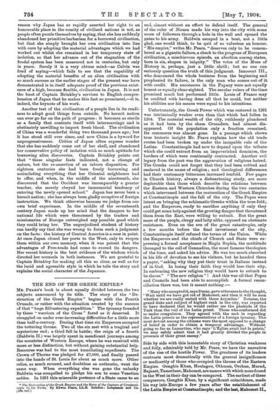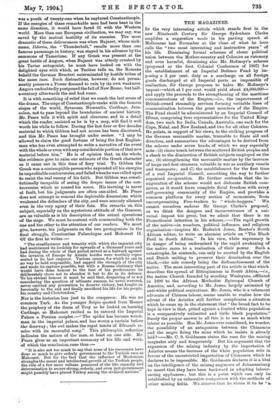Mx. PEARS'S book is about equally divided between the two
subjects announced by its title. The story of the "De- struction of the Greek Empire " begins with the Fourth Crusade, or rather with the situation created by the success of that " huge filibustering expedition." The tyranny founded by these " warriors of the Cross " fared as it deserved. It struggled on under ever-increasing difficulties for a little more than half-a-century. During that time six Emperors occupied the tottering throne. Two of the six met with a tragical and mysterious end ; a third fell in battle; the reign of a fourth (Baldwin II.) was largely spent in mendicant journeys among the countries of Western Europe, where he was received with more or less distinction, but without gaining substantial help. Recourse was had to the most humiliating expedients. The Crown of Thorns was pledged for £7,000, and finally passed into the hands of St. Louis for about as much more. Other relics, as much revered, and doubtless as authentic, went the same way. When everything else was gone the unlucky Baldwin was compelled to pledge his son to some Venetian nobles. In 1261 this miserable pretence of a State came to an
• The Destruction of the Greek Empire and the Story of the Capture of Constanti- nople by the Turks. By Edwin Pears, LL.B. London : Longman and Co. [18e. net.]
end, almost without an effort to defend itself. The general of the ruler of Nicaea made his way into the city with some score of followers through a hole in the wall and opened the gates to his army. Baldwin escaped in a boat, not a little glad, one would think, to be quit of so valueless an honour.
" His empire," writes Mr. Pears, " deserves only to be remem- bered as a gigantic failure, a check to the progress of European civilisation, a mischievous episode, an abortion among states, born in sin, shapen in iniquity." The voice of the Muse of History is, perhaps, just a little shrill ; but no one can seriously question the truth of this judgment. Innocent who denounced the whole business from the beginning and prophesied its failure, is the only man who comes out of it.
with credit. His successors in the Papacy were not equally honest or equally clear-sighted. The secular rulers of the time promised much but performed little. Louis of France may be credited with having done all that he could, but neither his abilities nor his means were equal to his intentions.
Unfortunately, the Greek Power which was restored in 1261 was intrinsically weaker even than that which had fallen in. 1204. The material wealth of the city, ruthlessly plundered as it had been by the sham Crusaders, had almost dis- appeared. Of the population only a fraction remained.. Its commerce was almost gone. In a passage which shows true historic insight Mr. Pears explains how the old trade routes had been broken up under the incapable rule of the Latins. Constantinople had now to depend upon the txibute- which she could extract from an impoverished dominion, the borders of which were continually contracted. Another evil legacy from the past was the aggravation of religious hatred._ The Greeks could not forget that they had been robbed and enslaved in the name of religion ; and theological differences. had their customary bitterness increased tenfold. Few pages in Church history, always a disheartening study, are more deplorable than those which describe the relations between the Eastern and Western Churches during the two centuries. which intervened between the restoration of the Greek Empire at Constantinople and the fall of the city. The Popes were.
intent on bringing the schismatic Greeks within the true fold ;. and the Emperors, ready to sacrifice anything if only they could get some help against the growing danger that threatened them from the East, were willing to submit. But the great mass of the people, clergy and laity alike, opposed an obstinate. resistance. Even on the eve of the great catastrophe, only a few months before the final investment of the city,.
Constantinople itself refused the terms of the Union. While the Emperors and the chiefs of Church and State were ex- pressing a formal acceptance in Hagia Sophia, the multitude- thronged to the cell of Gennadius, the most famous theologian of the time, and asked his advice. He was too much absorbed in his life of devotion to see his visitors, but he handed them a paper, " asking why they put their trust in Italians instead. of in God. In losing their faith they would lose their city.
In embracing the new religion they would have to submit to be slaves." " The new religion " ! And this was all that Popes and Councils had been able to accomplish. A formal recon- ciliation there was, but it meant nothing :—
"Many who accepted it, says Duces, gave utterance to the thought,. Wait until we have got rid of Mahomet, and then it will be seen whether we are really united with these Azymites.' Notaras, the grand duke and subject of highest rank in the city, was reported. to have declared that he would rather see the phakiola of the Turk than the veil of the Latin priest. Those who conformed did so under compulsion. They agreed with the mob in regarding the Latin priests as the representatives of a foreign tyranny. The. most devout among the citizens were the most opposed to a change of belief in order to obtain a temporal advantage. Without going so far as Lamartine, who says L'Eglise avait tue la patrie,' we may safely admit that it had greatly divided the people in. presence of their great enemy."
Side by side with this lamentable story of Christian weakness and folly, admirably told by Mr. Pears, we have the narrative of the rise of the hostile Power. The greatness of its leaders contrasts most dramatically with the general insignificance or mediocrity of those who occupied the throne of the Eastern. Empire. Genghis Khan, Houlagou, Othman, Orchan, Murad, Bajazet, Tamerlane, Mahomet, are names with which none found
in the West in their day can be compared. The earliest of these conquerors, Genghis Khan, by a significant coincidence, made his way into Europe a few years after the establishment of the Latin Empire at Constantinople; and the last, Mahomet
If the energies of these remarkable men had been bent in the same direction, it would have fared ill with the Western world. More than one European civilisation, we may say, was saved by the mutual hostility of its enemies. The most dramatic of these deliverances was when Bajazet, whose nick- name, Ilderim, the " Thunderbolt," recalls more than one famous personage in history, was stayed in his advance by the summons of Tamerlane. If any Greek was present at the great battle of Angora, when Bajazet was utterly crushed by his Tartar antagonist, he must have looked on with the delighted eyes with which, as Tacitus tells us, the Romans beheld the German Bructeri exterminated by hostile tribes of the same race. Such distractions, however, do not perma- nently preserve a Power doomed to ruin by its own weakness. Angora undoubtedly postponed the fall of New Rome; but half- a-century afterwards the end had come.
It is with something of relief that we reach the last scene of the drama. The siege of Constantinople ranks with the famous sieges of the world, Syracuse, Numantia, Carthage, Jeru- salem, not to pass beyond the boundaries of ancient history. Mr. Pears tells it with spirit and clearness, and in a detail which the reader, assisted as he is by a map, will find it well worth his while to follow. During the last four or five decades material to which Gibbon had not access has been discovered, and this Mr. Pears has brought under review. " I may be allowed to claim the good fortune of being the first English- man who has even attempted to write a narrative of the event with the whole or even with any considerable portion of that new material before him." He is of opinion that, on the whole, the evidence goes to raise our estimate of the Greek character as it came out in this time of fiery trial. To Gibbon the Greek was a contemptible person who expended all his energies an unprofitable controversies, and failedwhen he was called upon to resist the real enemy of his faith. But Gibbon was consti- tutionally incapable of seeing the deeper issues of the con- troversies which so roused his scorn. His learning is never at fault, but his judgments are often one-sided. Mr. Pears does not attempt to conceal the deplorable dissensions which weakened the defenders of the city, and were scarcely silenced .even in the very agony of their fate. His remarks on this subject, especially on the mysterious attitude of the Genoese, are as valuable as is his description of the actual operations of the siege. We must be content with commending both the one and the other to the attention of our readers. We must give, however, his judgments on the two protagonists in the Ind struggle, Constantine Palaeologus and Mahomet Of the first he writes :—
" The steadfastness and tenacity with which the imperial city had maintained its lordship for upwards of a thousand years and had during the whole of that period served as a bulwark against the invasion of Europe by Asiatic hordes were worthily repre- sented in its last emperor. Various causes, for which he can in no way be held responsible, had sapped the strength of the city and made its capture possible, but with a Boman obstinacy that would have done honour to the best of his predecessors he deliberately chose not to abandon it but to die in its defence. To his eternal honour it must be said that, despairing of or not oonsidering the question of ultimate success, he never wavered, never omitted any precaution to deserve victory, but fought on heroically to the end and finally sacrificed his life for his people, his country and Christendom."
Nor is the historian less just to the conqueror. He was no common Turk. As the younger Scipio quoted from Homer the prophecy of the doom of Troy as he looked on burning 'Carthage, so Mahomet recited as he entered the Imperial Palace a Persian couplet :—" The spider has become watch- man in the imperial palace, and has woven a curtain before the doorway ; the owl makes the royal tombs of Efrasaib re- .echo with its mournful song." This philosophic reflection indicates the nature of the man, at least on one side. Mr. Pears gives us an important summary of his life and work, of which the conclusion. runs thus :—
" It is also not too much to say that none of his successors have done so much to give orderly government to the Turkish race as Mahomet. But for the fact that the influence of Moslemism strangles the moral and intellectual growth of the Turkish people, the rule of a few more sultans possessed of the like capacity and determination to secure strong, orderly, and even just government might possibly have placed Turkey among the civilised nations."











































 Previous page
Previous page